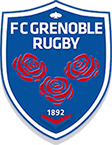In the Pro D2 marathon, Grenoble's coaches keep their group on the move a lot. Lilian Saseras explains how the players appreciate this system.
The trip to Montauban
"The least difficult, only, I think, in terms of ranking. Because we know that it's precisely on these matches, after winning against a Top 6 competitor, there's often a little decompression. In Montauban, they lost last week against Aix-en-Provence in the maintenance race. It's going to be, I think, very complicated. It seems to me that on their last landing, they beat Oyonnax, also a Top 6 contender. So this is a team that also knows how to respond in its own stadium. I remember that they also played a very big away game in Biarritz, before the match against Oyonnax. It's a team that's getting back into rugby, which is dangerous, with quality players and a quality squad. The important thing is really not to lose concentration and not to project yourself too quickly at the end of the block. There's a big boulder this weekend and it's important to go there with a lot of humility and a lot of desire. "
The difficulties of the FCG during its last away game
"The last time we moved, it went very badly. We were on a block where we had three trips and a home game. And the last trip to Nevers, we were suffocated right from the start of the game. You have to be careful about that. We're in the middle of the block. We had a big win last week that was important. Now it's over. We're not looking ahead to the Biarritz game yet. We need to be there from the outset, right from the kick-off, so we don't let these Montalbanais get the upper hand, build up our confidence and suffocate us like we did in Nevers. "
Rotation within the group
"We live it like the whole group. It's something that helps to stimulate, to always put the players in competition with each other. To find out how it works with this staff, it was a bit the same in Pro D2 two years ago. The important thing is to create an emulation with the competition, which happens at every position. Which is important. Despite everything, we still have some automatisms, because we work a lot on training, with different hinges. It changes a lot too, in the end... The advantage is that we also work with everyone. That's a good thing. It stimulates the group. Afterwards, of course, everyone's performance is evaluated. Surely, at the end of the season, the rotation will diminish towards a pair, or even a quartet, which will surely be smaller. But, today, everyone has his chance. In fact, there are several. And has new chances, even after a match that went a little less well or even very well. I think that the quality of this rotation is to know how to rotate after a good match. And also, to know how to raise after a bad one. And not just being in a penalty-reward system. I think it's also easier for the players to accept that when you're rotated after a good match, you don't see the rotation as a sanction. On the other hand, when you miss a match and you don't necessarily get a penalty, if you get a chance the following week, that's also a way of holding your group together from a purely managerial point of view. And not to be in a penalty-reward system. For the moment, it's a system that works, we're second in the championship. We have the opportunity again this weekend to come out on top or at least to stay in contact with Colomiers. We know that as long as Colomiers don't make a mistake, for the moment we'll stay behind. But in important positions, strategically speaking like the hinge, what's important is that the players work together. Whether it's on match preparations or training sessions, there's a lot of communication and exchange. And try to be all on the same page when you're called upon to play. "
Auteur : FCG Rugby
